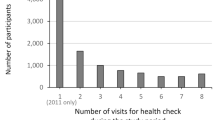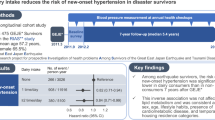Abstract
Natural disasters force many evacuees to change several aspects of their lifestyles. This longitudinal study aimed to investigate whether factors such as living environment and lifestyle factors were related to new-onset hypertension in survivors of the Great East Japan Earthquake over a long-term follow-up of up to 7 years after the earthquake. The present study examined data collected from 29,025 Japanese participants aged 39–89 years, sourced from general health checkups and the Fukushima Mental Health and Lifestyle Survey, which was conducted in 13 communities between 2011 and 2018. A total of 10,861 participants received follow-up examinations. During a median follow-up of 4.3 years, 3744 participants (1588 men, 41.4%; 2,156 women, 30.7%) had newly developed hypertension. Heavy drinking (adjusted hazard ratio 1.38, 95% confidence interval 1.21–1.57, p < 0.001) and obesity (adjusted hazard ratio 1.27, 95% confidence interval 1.19–1.37, p < 0.001) were significantly associated with new-onset hypertension after the disaster in multivariate-adjusted analysis. Furthermore, experiencing evacuation after the disaster was also significantly associated with the risk of new-onset hypertension in men (adjusted hazard ratio 1.14, 95% confidence interval 1.02–1.27, p = 0.016). The present study indicated that lifestyle factors, such as drinking and obesity, and evacuation experience in men had significant effects on the risk of new-onset hypertension in the long term after the earthquake.
This is a preview of subscription content, access via your institution
Access options
Subscribe to this journal
Receive 12 print issues and online access
$259.00 per year
only $21.58 per issue
Buy this article
- Purchase on SpringerLink
- Instant access to the full article PDF.
USD 39.95
Prices may be subject to local taxes which are calculated during checkout

Similar content being viewed by others
References
Trichopoulos D, Katsouyanni K, Zavitsanos X, Tzonou A, Dalla-Vorgia P. Psychological stress and fatal heart attack: the Athens (1981) earthquake natural experiment. Lancet. 1983;1:441–4.
Leor J, Poole WK, Kloner RA. Sudden cardiac death triggered by an earthquake. N Engl J Med. 1996;334:413–9.
Tanaka K, Nakayama M, Kanno M, Kimura H, Watanabe K, Hayashi Y, et al. Aftercare for the prevention of a secondary health disaster in survivors of major earthquakes. Hypertens Res. 2013;36:759–61.
Kario K, Matsuo T, Kobayashi H, Yamamoto K, Shimada K. Earthquake-induced potentiation of acute risk factors in hypertensive elderly patients: possible triggering of cardiovascular events after a major earthquake. J Am Coll Cardiol. 1997;29:926–33.
Kario K. Disaster hypertension - its characteristics, mechanism, and management. Circ J. 2012;76:553–62.
Narita K, Hoshide S, Tsoi K, Siddique S, Shin J, Chia YC, et al. Disaster hypertension and cardiovascular events in disaster and COVID-19 pandemic. J Clin Hypertens (Greenwich). 2021;23:575–83.
Saito K, Kim JI, Maekawa K, Ikeda Y, Yokoyama M. The great Hanshin-Awaji earthquake aggravates blood pressure control in treated hypertensive patients. Am J Hypertens. 1997;10:217–21.
Ohira T, Hosoya M, Yasumura S, Satoh H, Suzuki H, Sakai A, et al. Evacuation and Risk of Hypertension After the Great East Japan Earthquake: The Fukushima Health Management Survey. Hypertension. 2016;68:558–64.
Yasumura S, Hosoya M, Yamashita S, Kamiya K, Abe M, Akashi M, et al. Study protocol for the Fukushima Health Management Survey. J Epidemiol. 2012;22:375–83.
International guidelines for ethical review of epidemiological studies. Law Med Health Care.1991;19:247–58.
Umemura S, Arima H, Arima S, Asayama K, Dohi Y, Hirooka Y, et al. The Japanese Society of Hypertension Guidelines for the Management of Hypertension (JSH 2019). Hypertens Res. 2019;42:1235–481.
Matsuo S, Imai E, Horio M, Yasuda Y, Tomita K, Nitta K, et al. Revised equations for estimated GFR from serum creatinine in Japan. Am J Kidney Dis. 2009;53:982–92.
Kessler RC, Barker PR, Colpe LJ, Epstein JF, Gfroerer JC, Hiripi E, et al. Screening for serious mental illness in the general population. Arch Gen Psychiatry. 2003;60:184–9.
Furukawa TA, Kawakami N, Saitoh M, Ono Y, Nakane Y, Nakamura Y, et al. The performance of the Japanese version of the K6 and K10 in the World Mental Health Survey Japan. Int J Methods Psychiatr Res. 2008;17:152–8.
Intersalt: an international study of electrolyte excretion and blood pressure. Results for 24 h urinary sodium and potassium excretion. Intersalt Cooperative Research Group. Bmj. 1988;297:319–28.
Chei CL, Iso H, Yamagishi K, Tanigawa T, Cui R, Imano H, et al. Body fat distribution and the risk of hypertension and diabetes among Japanese men and women. Hypertens Res. 2008;31:851–7.
Nakamura K, Okamura T, Hayakawa T, Hozawa A, Kadowaki T, Murakami Y, et al. The proportion of individuals with alcohol-induced hypertension among total hypertensives in a general Japanese population: NIPPON DATA90. Hypertens Res. 2007;30:663–8.
Saunders JB, Beevers DG, Paton A. Factors influencing blood pressure in chronic alcoholics. Clin Sci (Lond). 1979;57:295s–298s.
Husain K, Ansari RA, Ferder L. Alcohol-induced hypertension: Mechanism and prevention. World J Cardiol. 2014;6:245–52.
Nordløkken A, Pape H, Wentzel-Larsen T, Heir T. Changes in alcohol consumption after a natural disaster: a study of Norwegian survivors after the 2004 Southeast Asia tsunami. BMC Public Health. 2013;13:58.
Ohmori S, Kiyohara Y, Kato I, Kubo M, Tanizaki Y, Iwamoto H, et al. Alcohol intake and future incidence of hypertension in a general Japanese population: the Hisayama study. Alcohol Clin Exp Res. 2002;26:1010–6.
Orui M, Ueda Y, Suzuki Y, Maeda M, Ohira T, Yabe H, et al. The Relationship between Starting to Drink and Psychological Distress, Sleep Disturbance after the Great East Japan Earthquake and Nuclear Disaster: The Fukushima Health Management Survey. Int J Environ Res Public Health. 2017;14:1281.
Field AE, Coakley EH, Must A, Spadano JL, Laird N, Dietz WH, et al. Impact of overweight on the risk of developing common chronic diseases during a 10-year period. Arch Intern Med. 2001;161:1581–6.
Kishimoto M, Noda M. The Great East Japan Earthquake: Experiences and Suggestions for Survivors with Diabetes (perspective). PLoS Curr. 2012;4:e4facf9d99b997.
Zhang W, Ohira T, Abe M, Kamiya K, Yamashita S, Yasumura S, et al. Evacuation after the Great East Japan Earthquake was associated with poor dietary intake: The Fukushima Health Management Survey. J Epidemiol. 2017;27:14–23.
Satoh H, Ohira T, Hosoya M, Sakai A, Watanabe T, Ohtsuru A, et al. Evacuation after the Fukushima Daiichi Nuclear Power Plant Accident Is a Cause of Diabetes: Results from the Fukushima Health Management Survey. J Diabetes Res. 2015;2015:627390.
Hashimoto S, Nagai M, Fukuma S, Ohira T, Hosoya M, Yasumura S, et al. Fukushima Health Management Survey G. Influence of Post-disaster Evacuation on Incidence of Metabolic Syndrome. J Atheroscler Thromb. 2017;24:327–37.
Honda K, Okazaki K, Tanaka K, Kazama JJ, Hashimoto S, Ohira T, et al. Evacuation after the Great East Japan Earthquake is an independent factor associated with hyperuricemia: The Fukushima Health Management Survey. Nutr Metab Cardiovasc Dis. 2021;31:1177–88.
Hoshide S, Nishizawa M, Okawara Y, Harada N, Kunii O, Shimpo M, et al. Salt Intake and Risk of Disaster Hypertension Among Evacuees in a Shelter After the Great East Japan Earthquake. Hypertension. 2019;74:564–71.
Acknowledgements
We thank the expert committee members, advisors, and staff of the Fukushima Health Management Survey Group for conducting the present survey and for their support.
Funding
This survey, as well as the design and conduct of the study, was supported by the National Health Fund for Children and Adults Affected by the Nuclear Incident.
Author information
Authors and Affiliations
Corresponding author
Ethics declarations
Conflict of interest
The authors declare no competing interests.
Additional information
Publisher’s note Springer Nature remains neutral with regard to jurisdictional claims in published maps and institutional affiliations.
Supplementary information
Rights and permissions
About this article
Cite this article
Kobari, E., Tanaka, K., Nagao, M. et al. Impact of lifestyle and psychosocial factors on the onset of hypertension after the Great East Japan earthquake: a 7-year follow-up of the Fukushima Health Management Survey. Hypertens Res 45, 1609–1621 (2022). https://doi.org/10.1038/s41440-022-00968-3
Received:
Revised:
Accepted:
Published:
Version of record:
Issue date:
DOI: https://doi.org/10.1038/s41440-022-00968-3
Keywords
This article is cited by
-
Psychological distress—pathophysiology of newly developed hypertension after the Great East Japan Earthquake
Hypertension Research (2022)



